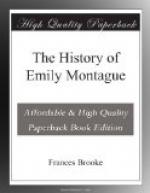It is not absolutely certain that a marriage of which love is the foundation will be happy; but it is infallible, I believe, that no other can be so to souls capable of tenderness.
Half the world, you will please to observe, have no souls; at least none but of the vegetable and animal kinds: to this species of beings, love and sentiment are entirely unnecessary; they were made to travel through life in a state of mind neither quite awake nor asleep; and it is perfectly equal to them in what company they take the journey.
You and I, my dear, are something awakened; therefore it is necessary we should love where we marry, and for this reason: our souls, being of the active kind, can never be totally at rest; therefore, if we were not to love our husbands, we should be in dreadful danger of loving somebody else.
For my part, whatever tall maiden aunts and cousins may say of the indecency of a young woman’s distinguishing one man from another, and of love coming after marriage; I think marrying, in that expectation, on sober prudent principles, a man one dislikes, the most deliberate and shameful degree of vice of which the human mind is capable.
I cannot help observing here, that the great aim of modern education seems to be, to eradicate the best impulses of the human heart, love, friendship, compassion, benevolence; to destroy the social, and encrease the selfish principle. Parents wisely attempt to root out those affections which should only be directed to proper objects, and which heaven gave us as the means of happiness; not considering that the success of such an attempt is doubtful; and that, if they succeed, they take from life all its sweetness, and reduce it to a dull unactive round of tasteless days, scarcely raised above vegetation.
If my ideas of things are right, the human mind is naturally virtuous; the business of education is therefore less to give us good impressions, which we have from nature, than to guard us against bad ones, which are generally acquired.
And so ends my sermon.
Adieu! my dear!
Your faithful
A.
Fermor.
A letter from your brother; I believe the dear creature is out of his wits: Emily has consented to marry him, and one would imagine by his joy that nobody was ever married before.
He is going to Lake Champlain, to fix on his seat of empire, or rather Emily’s; for I see she will be the reigning queen, and he only her majesty’s consort.
I am going to Quebec; two or three dry days have made the roads passable for summer carriages: Fitzgerald is come to fetch me. Adieu!
Eight o’clock.
I am come back, have seen Emily, who is the happiest woman existing; she has heard from your brother, and in such terms—his letter breathes the very soul of tenderness. I wish they were richer. I don’t half relish their settling in Canada; but, rather than not live together, I believe they would consent to be set ashore on a desart island. Good night.




